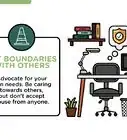This article was co-authored by Nicolette Tura, MA. Nicolette Tura is an Authentic Living Expert who operated her own wellness business for more than ten years in the San Francisco Bay Area. Nicolette is a 500-hour Registered Yoga Teacher with a Psychology & Mindfulness Major, a National Academy of Sports Medicine (NASM) certified Corrective Exercise Specialist, and is an expert in authentic living. She holds a BA in Sociology from the University of California, Berkeley and got her master's degree in Sociology from SJSU. She constantly draws from her own wounds and challenges; with her training in the healing arts and sociology, she offers potent content, powerful meditations, and game-changing seminars on inspiring elevation on a personal and corporate level.
There are 27 references cited in this article, which can be found at the bottom of the page.
This article has been viewed 421,546 times.
Every young woman wants to be a success in her personal and professional lives. But the path to success can be tricky and navigating it requires that you be proactive in several aspects of your life. But with some dedication and by following some key tips, you will pave the way to personal and professional success.
Steps
Being Successful Personally
-
1Set goals. Before you can set yourself on the path of being successful in your personal life, it’s a good idea to set goals for yourself. By tangibly establishing what your aims are in the short, mid, and long terms, you have an easy way to remind yourself of what you’re working towards.
- Write your goals on paper. Having a visual cue reminds you of and reinforces your goals. For example, you could write the following: “My short term goal is to find a nice partner and finish my Master’s degree. My mid-term goal is to get engaged and find an exciting job. My long term goal is to get married and have a family while being a successful financial planner.”
- Update your goals as you meet them. Once or twice a year, reevaluate your goals to make sure they’re still realistic and attainable.
- Setting unrealistic goals will not only cause you unnecessary anxiety, but can also hamper your success and the ability to meet other goals.[1] Consider talking to a therapist about setting personal goals or any anxiety related to them you may have.[2]
- Know your list of things to do and goals will never be finished and that it’s ok. As you attain your goals and cross items off of your to-do list, you’ll also be adding new items.[3]
-
2Have confidence and believe that you will be successful. Two characteristics of a successful person is that they not only have confidence in themselves, but also that they believe in their ability to succeed.[4] By cultivating and projecting confidence in yourself and to others, you set yourself on the path for success.
- Confidence comes from many sources, including knowing that you have a good education and training, good relationships, or even that you look good. If you are lacking confidence in certain areas, take proactive steps to boost it.
- For example, if you don’t feel confident because they your friends are more successful professionally, then work towards garnering more professional success through education or even a promotion. If your appearance leaves you feeling not confident, improve it. Something as simple as revived hair color can do wonders.
- It’s important to know that even if you are confident and successful, that failure is a part of the equation.[5]
- Disappointment and failure are components of success.[6] Even someone like author J.K. Rowling experienced failures before they hit it big.
Advertisement -
3Don’t expect perfection from yourself- or anyone else. As you strive to meet your goals, be confident and believe in your success, it’s important to not expect perfection from yourself or those around you. In fact, trying to be perfect often hampers your ability to perform well and can alienate those around you.[7]
- Perfectionism doesn’t mean that you’re not trying to be your best, it means you’re reaching towards an unattainable goal.[8] For example, if you are trying to have the “perfect” body, any minor setback may hinder you from enjoying yourself. It’s best to love yourself the way you are and work from there.
- Expecting perfection from others can seriously and negatively affect your relationships, even causing them to break.[9]
-
4Have meaningful personal relationships. Surrounding yourself with genuine friends and colleagues who will support you through good times and bad is essential to your success.[10] It’s important to maintain these relationships over time to ensure your success and boost your confidence.
- Beyond having meaningful relationships with friends, colleagues, and families, it’s also important to have a supportive partner. A partner can instill confidence in you and will support your goals for achieving personal and professional success.
- Part of fostering meaningful relationships is that you reciprocate the support and love you receive.
- Expressing gratitude is a key feature of having meaningful relationships. It’s important to show anyone who helps you along the way how much you appreciate them.[11]
-
5Take care of yourself physically and mentally. You can’t be successful if you don’t take care of your physical and mental health. Exercise is an excellent way to relieve stress, and increase endorphins and energy.[12]
- Taking a short walk twice a day will refresh your body and mind.[13] For example, a 3 mile (4.8 km) run will give you time to work out personal or professional problems if you need to while providing your body with needed exercise to maintain your health.
- In a world where you are easily contacted by cell phones, email, and social media, having unplugged alone time is vital to maintaining your health by minimizing how much input you need to process on a daily basis.[14] For example, you can turn off all electronics at 10pm so that you have an hour or two all to yourself or with your family. Another option is exercising, such as going for a walk or run, to have some time alone.
EXPERT TIPNicolette Tura is an Authentic Living Expert who operated her own wellness business for more than ten years in the San Francisco Bay Area. Nicolette is a 500-hour Registered Yoga Teacher with a Psychology & Mindfulness Major, a National Academy of Sports Medicine (NASM) certified Corrective Exercise Specialist, and is an expert in authentic living. She holds a BA in Sociology from the University of California, Berkeley and got her master's degree in Sociology from SJSU. She constantly draws from her own wounds and challenges; with her training in the healing arts and sociology, she offers potent content, powerful meditations, and game-changing seminars on inspiring elevation on a personal and corporate level.Authentic Living Expert
 Nicolette Tura, MA
Nicolette Tura, MA
Authentic Living ExpertCelebrate your uniqueness. Don't look for external validation. Instead, focus on self-love and self-care, and try to believe in yourself and know your worth. Then, you'll feel beautiful and confident, and you'll radiate that outward. Then, people will see that, rather than insecurity, worry, or doubt, and they'll respond to that more than you know.
-
6Watch your finances. It is difficult to have personal success if your finances are not in order. By controlling your financial profile, you can not only boost your confidence, but also afford yourself opportunities such as education that may come up.
- It’s important to budget. Knowing where your money is coming from and how you’re spending it will help you control your finances more effectively.[15] Part of this equation is using credit wisely[16] and not making impulse buys that you can’t really afford.[17] For example, you wouldn’t want to rent an apartment that cost $1500 per month when you’re only making $2000 per month.
- Make sure you’re saving money routinely. If something catastrophic happens, you will need a reserve to get you through the hard times. But you may also want to save it for something special, like a big vacation, which is important to helping you recharge and, if you go with others, connecting with them.[18]
Being Successful Professionally
-
1Make a plan and set goals. Just as you do for your personal life, you need to set goals for your professional life. By tangibly establishing what your aims are in the short, mid, and long terms, you have an easy way to remind yourself of what you’re working towards. This will also help you formulate a plan to achieve those goals.
- Write down your goals on paper. It’s a good idea to have a visual reminder of your goals. For example you could write: “My short term goal is to do an internship as an editor, my mid-term goal is to get a Master’s in English, and my long-term goal is to work as the Editor-in-Chief of Vogue.”
- Make sure to update your goals as you meet them. Once or twice a year, reevaluate your goals to make sure they’re still realistic and attainable and set new ones as necessary. It is often useful to discuss these with a colleague or even your boss.
- Don’t set unrealistic goals for yourself. This will not only cause you unnecessary anxiety, but can also hamper your ability to meet other goals.[19] For example, if you’re currently working in the mailroom, it’s highly unlikely you will be the CEO within a year. But you can work up from the mailroom to the reception area and then up from that position, for example.
- Talking with a senior colleague or trusted supervisor can help allay any concerns or anxiety you may have regarding your career.[20]
-
2Get as much education and training as you can. Having an education and job-related training is integral to being successful professionally. But you also want to make sure that you continue your education and training throughout your career so that you stay valuable to your workplace or are marketable if you choose to change jobs.
- There are many ways to get education for your job. It’s a good idea to research the requirements for your chosen profession. For example, if you want to be a university professor, you’ll need a PhD and some training for being in the classroom. If you want to be a wedding planner, on the other hand, you’ll need more on the job education and training than actual degrees.
- Training and the type of education that comes from practical experience is also very valuable when you’re marketing yourself professionally. For example, working as an editorial assistant at a magazine can help you get a job as an editor.
- Knowing that you have the right education and training is also helpful because it will build your confidence and make you more attractive to employers or potential employers.
-
3Have confidence and believe that you will be successful professionally. Two characteristics of a successful person is that they not only have confidence in themselves, but also that they believe in their ability to succeed.[21] By cultivating and projecting confidence in yourself, you set yourself on the path for success not only to yourself, but also to employers.
- Knowing that you have a good education and training can help boost your confidence. If you are lacking confidence in certain areas, take proactive steps to boost it.
- For example, if you don’t feel confident because your colleagues are often promoted over you, then work towards garnering more professional success through education or even a promotion. Talking to your boss or another colleague about how to improve your performance is also an excellent idea.
- It’s important to know that even if you are confident and successful, that failure is a part of the equation.[22] Both Bill Gates and Steve Jobs experienced failures before they found success.
-
4Be passionate about what you do. You can’t be truly successful unless you are passionate about your profession. If you don’t love your job, you’re less likely to go above and beyond for success.[23]
- Your job will feel like chore if you don’t love it. This will make you more likely to be sloppy in your assignments and not take any initiative that would help you succeed.[24]
-
5Don’t be afraid to take risks. Changing your professional course to put yourself on the path to success requires taking some risk. However, this doesn’t mean making reckless decisions, rather that you should take a calculated risk.[25]
- The idea is to take a calculated risk, not something that could ultimately hinder your goals. For example, maybe you love your current workplace, but have hit the glass ceiling. When an opportunity for a promotion at another company comes up, weigh the advantages and disadvantages of taking the job and assess how much risk the switch could have on you personally and professionally. Either way you decide, you’re taking a calculated risk.
-
6Be an effective communicator. As the work place increasingly shifts towards more team-based work, greater customer contact, more diversity, and ever-higher employee expectations, the ability to effectively and positively communicate with colleagues is absolutely integral to your professional success. Being an effective communicator demands everything from being a good listener to being polite and having the ability to express your gratitude.
- Be a good listener to anyone associated with you professionally. The ability to listen to someone’s needs or problems will not only help cultivate your relationship with the person, but also may help your own goals down the road.
- Always be polite to people, even if they aren’t. The truism “you win more bees with honey than vinegar” is something you can apply to your professional life. Leaving a bad impression on colleagues or associates can have lasting consequences for you professionally.[26]
- Being polite extends to when you have to deliver bad news to someone professionally. For example, if you have to fire someone, say something positive to the person, followed by the negative, and then sandwich that in without another bit of positive feedback.
- Express gratitude to your colleagues. The ability to recognize when someone has supported you is important to maintaining good working relationships. Not only will it make the person feel appreciated and show them that you respect their contributions, but you will gain personal capital among your colleagues.
-
7Foster good working relationships. Without having positive working relationships with colleagues at all of your jobs, you cannot be successful. It’s thus important to maintain and expand your professional support system over time.
- Part of fostering good working relationships is networking. Having a broad network of colleagues and even professional friends on whom you can rely will serve you professionally not only in your current job, but also among former colleagues or those you may have down the road.<[27]
- Having a mentor who has experience in your profession is a good idea. She can provide you valuable guidance from everything on taking risks, to dealing with colleagues, or improving your skills.
- Don’t expect perfection your colleagues- or yourself. This can seriously and negatively affect your working relationships, and you’re your professional success.[28]
- Know that it’s also acceptable to be wrong, especially if it means maintaining a professional relationship. This shows that you’re the bigger person.[29]
-
8Take breaks- and vacations. Having time away from your job for everything from ten minutes a day to a full vacation is important to your success as well. Time away refreshes you, helps you avoid burn out, and can reset you on your path to success.[30]
- Take breaks during the day. They give your brain and body a chance to relax and refresh.[31]
- Schedule annual vacations to further help you refresh. While a ten-minute walk or a run will help you decompress throughout a workday, an annual vacation where you completely unplug from your job will refresh your body and mind.
References
- ↑ https://hbr.org/2021/01/why-we-set-unattainable-goals
- ↑ https://www.psychologytoday.com/blog/in-practice/201302/6-success-tips-people-who-are-anxious-or-sensitive
- ↑ https://hbr.org/2020/03/stop-feeling-guilty-about-your-to-do-list
- ↑ https://repositories.lib.utexas.edu/bitstream/handle/2152/25708/THe%20Magic%20of%20Thinking%20Big%20by%20David%20Schwartz.pdf?sequence=128&isAllowed=y
- ↑ https://hbr.org/2011/04/strategies-for-learning-from-failure
- ↑ https://www.psychologytoday.com/blog/in-practice/201302/6-success-tips-people-who-are-anxious-or-sensitive
- ↑ http://www.cnn.com/2010/LIVING/11/01/give.up.perfection/index.html
- ↑ https://www.usf.edu/student-affairs/counseling-center/top-concerns/what-is-self-confidence.aspx
- ↑ https://www.shrm.org/hr-today/news/hr-magazine/0318/pages/there-are-no-perfect-people,-so-why-expect-perfect-hr-candidates.aspx
- ↑ https://plato.stanford.edu/entries/personal-relationship-goods/
- ↑ https://www.health.harvard.edu/healthbeat/giving-thanks-can-make-you-happier
- ↑ https://www.nimh.nih.gov/health/topics/caring-for-your-mental-health
- ↑ https://www.helpguide.org/articles/stress/quick-stress-relief.htm
- ↑ https://www.adventisthealth.org/blog/2019/march/the-benefits-of-unplugging-from-electronics/
- ↑ https://raisingchildren.net.au/grown-ups/family-life/managing-money/managing-money
- ↑ https://www.aier.org/wp-content/uploads/2015/03/EB200902.pdf
- ↑ https://link.springer.com/article/10.1007/s11747-019-00670-w
- ↑ https://moneysmart.gov.au/saving/simple-ways-to-save-money
- ↑ https://www.powerofpositivity.com/unrealistic-goals-dangers/
- ↑ https://www.psychologytoday.com/blog/in-practice/201302/6-success-tips-people-who-are-anxious-or-sensitive
- ↑ https://www.usf.edu/student-affairs/counseling-center/top-concerns/what-is-self-confidence.aspx
- ↑ https://www.entrepreneur.com/leadership/failure-is-the-seed-of-growth-and-success/239360
- ↑ http://www.huffingtonpost.com/2013/08/26/things-successful-women-do-differently_n_3787406.html
- ↑ https://appliedpsychologydegree.usc.edu/blog/how-liking-your-job-will-help-you-succeed/
- ↑ https://online.wharton.upenn.edu/blog/is-risk-taking-behavior-key-to-entrepreneurial-spirit/
- ↑ https://online.wharton.upenn.edu/blog/is-risk-taking-behavior-key-to-entrepreneurial-spirit/
- ↑ https://www.aafp.org/pubs/fpm/issues/2006/0100/p47.html
- ↑ https://hbr.org/tip/2020/02/dont-let-perfect-be-the-enemy-of-good
- ↑ https://rkenedy.info.yorku.ca/online-links/critical-skills-for-students/why-is-it-great-to-be-able-to-make-mistakes/
- ↑ https://www.sciencedirect.com/science/article/pii/S2666957920300069
- ↑ https://www.edutopia.org/article/research-tested-benefits-breaks
About This Article
To be a successful young woman, begin by setting both personal and professional goals for yourself. Then, write them down and update them as necessary to keep yourself on track. Focus on getting a good education or training for the professional goals you’ve chosen, since it will prepare you for a career you’re passionate about and also you help gain confidence. It’s good to work hard to become successful, but make sure you take care of yourself by going on vacations, getting enough exercise, and spending time with friends. If you want to learn more about how to manage your finances and make meaningful relationships, keep reading!








































































